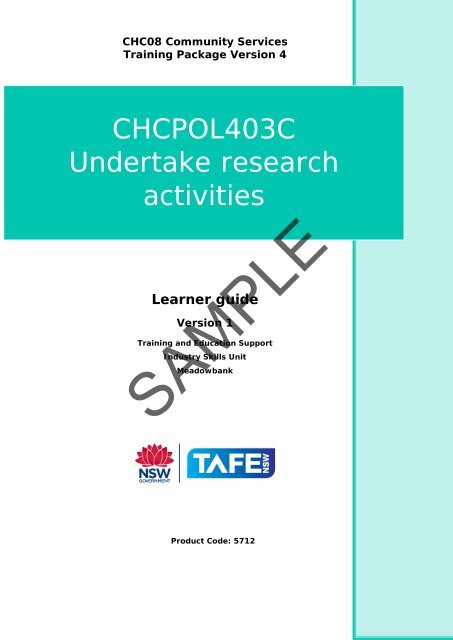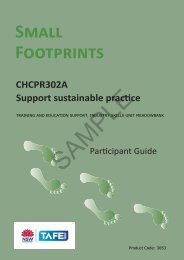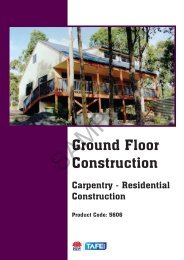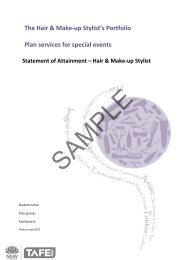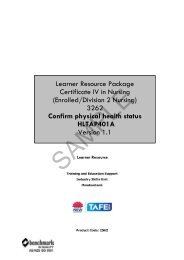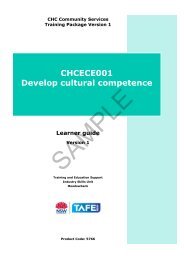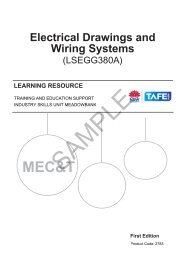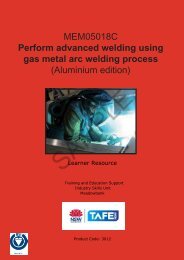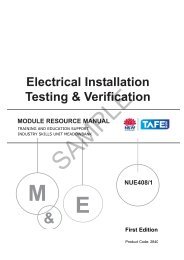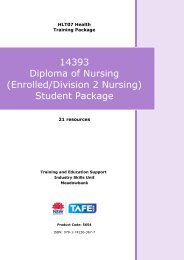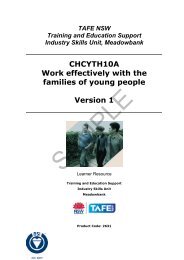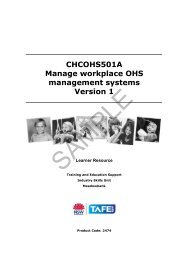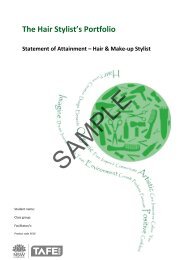CHCPOL403C Undertake research activities - vetres
CHCPOL403C Undertake research activities - vetres
CHCPOL403C Undertake research activities - vetres
Create successful ePaper yourself
Turn your PDF publications into a flip-book with our unique Google optimized e-Paper software.
CHC08 Community ServicesTraining Package Version 4<strong>CHCPOL403C</strong><strong>Undertake</strong> <strong>research</strong><strong>activities</strong>Learner guideVersion 1Training and Education SupportIndustry Skills UnitMeadowbankSAMPLEProduct Code: 5712
<strong>CHCPOL403C</strong> <strong>Undertake</strong> <strong>research</strong> <strong>activities</strong>AcknowledgmentsThe TAFE NSW Training and Education Support Industry Skills Unit, Meadowbankwould like to acknowledge the support and assistance of the following people inthe production of this learner resource guide:Writer:Tracy RedmanTeacher, Child and Family ServicesTAFE NSWContributors:Katy GouldLouise KingLisa WallmeyerTeachers, Child and Family ServicesTAFE NSWDianne NixonConsultantReviewer:Louise HolzTeacher, Child and Family ServicesTAFE NSWArtwork:Ashley “Flarey” RedmanProject Manager:Gail HorwoodA/Education Programs ManagerTAFE NSWEnquiries:SAMPLEEnquiries about this and other publications can be made to:Training and Education Support Industry Skills Unit, MeadowbankMeadowbank TAFELevel 3, Building J,See Street,MEADOWBANK NSW 2114Tel: 02-9942 3200 Fax: 02-9942 3257Developed by Training & Education Support Industry Skills Unit, Meadowbank© TAFE NSW 2012
CHCPOL403B <strong>Undertake</strong> <strong>research</strong> <strong>activities</strong>© The State of New South Wales, Department of Education and Training, TAFENSW, Training and Education Support Industry Skills Unit, Meadowbank, 2012.Copyright of this material is reserved to TAFE NSW Training and Education SupportIndustry Skills Unit, Meadowbank. Reproduction or transmittal in whole or in part, otherthan for the purposes of private study or <strong>research</strong>, and subject to the provisions of theCopyright Act, is prohibited without the written authority of, TAFE NSW. Training andEducation Support Industry Skills Unit, Meadowbank.ISBN 978-1-74236-421-6SAMPLEDeveloped by Training & Education Support Industry Skills Unit, Meadowbank© TAFE NSW 2012
<strong>CHCPOL403C</strong> <strong>Undertake</strong> <strong>research</strong> <strong>activities</strong>Table of ContentsIntroduction ............................................................................................. 71. General introduction ..................................................................................................... 72. Using this learner guide ................................................................................................. 73. Prior knowledge and experience ................................................................................... 94. Unit of competency overview ..................................................................................... 105. Assessment .................................................................................................................. 13Section 1 Research issues ...................................................................... 16Research issues ................................................................................................................... 16Stakeholders in <strong>research</strong> ..................................................................................................... 27Section 2 Research Methods ................................................................... 38Research methods and design ............................................................................................ 38Section 3 Developing your <strong>research</strong> project ........................................... 78Developing your <strong>research</strong> project ....................................................................................... 78Section 4 Writing the <strong>research</strong> report .................................................. 102Writing the <strong>research</strong> report .............................................................................................. 102Answers and feedback to <strong>activities</strong> ...................................................... 112Section 1 ............................................................................................................................ 112Section 2 ............................................................................................................................ 115Section 3 ............................................................................................................................ 116Section 4 ............................................................................................................................ 116Reference List ...................................................................................... 118• United Nations Convention on the Rights of the Childhttp://www.unicef.org/crc/ .......................................................... 120General references ............................................................................... 120SAMPLEResources ............................................................................................ 122Relevant Journals .............................................................................................................. 122Websites ............................................................................................................................ 123APPENDICES ........................................................................................ 126Appendix 1 Frustrating and fun: involving preschoolers in program evaluation.............. 126Appendix 2- Glossary ......................................................................................................... 129Resource Evaluation Form .................................................................... 132Developed by Training & Education Support Industry Skills Unit, Meadowbank@ TAFE NSW 2012
<strong>CHCPOL403C</strong> <strong>Undertake</strong> <strong>research</strong> <strong>activities</strong>Section 1 Research issuesElements and performance criteria:1. Prepare a <strong>research</strong> plan1.1 Ensure views and interests of stakeholders are reflected in the <strong>research</strong>methodology and it and is compatible with ethical considerations1.2 Select <strong>research</strong> methodology suitable to needs, purposes and resourcesand to maximise credibility of outcomes1.3 Select and use <strong>research</strong> strategies appropriate to subject matter being<strong>research</strong>ed, the outcomes sought and the resources available1.4 Ensure <strong>research</strong> plan incorporates strategies for validating <strong>research</strong>outcomes2. Implement appropriate <strong>research</strong> strategies2.1 Determine and allocate resources needed to conduct <strong>research</strong>2.2 Ensure collection, recording and storage of all relevant information istimely and will ensure validity, confidentiality and security2.3 Identify a representative range of people and groups with an interest inthe issues and consult them in appropriate ways to ensure validity ofoutcomes2.4 <strong>Undertake</strong> consultation according to agreed practices and protocol ofown and other agencies2.5 Consider cultural sensitivities and ethical issues in all consultationResearch issuesMost community service workers, whether they work in services for the aged, ineducation and care, youth work, housing or other areas, will have to do someform of basic <strong>research</strong> at times during their work life. It may be <strong>research</strong> thatunderpins a funding proposal, evaluates your current service and programs, orprovides an argument for providing a new service. You may be gatheringinformation and ideas so you can improve on what you already do. Undertaking<strong>research</strong> can be as simple as determining the education and care hour needs ofparents or gathering client views on the services you offer. Or it may be as largeas a major piece of social <strong>research</strong> on the family support needs of a new housingestate. The basic process and ethics are still the same.SAMPLEYour <strong>research</strong> must be credible, reliable and valid if you expect people to payattention and make changes based on your findings. You need to get the <strong>research</strong>process right so that any recommendations you make are going to make adifference for the better. Your reporting needs to be clear and accessible. No-onewould want to recommend an intervention, programme or service based onsloppy <strong>research</strong> and find out people are getting hurt or money is wasted in theprocess! For example, what would happen in the following scenario?Page 16 of 135
CHCPOL403B <strong>Undertake</strong> <strong>research</strong> <strong>activities</strong>Melanie would like to open an education and care centre in a particular area, butisn’t quite sure whether or not the suburb can sustain another one, since thereare already four centres in the immediate area. She decides to <strong>research</strong> this byfinding out how many children are on the waiting lists of the existing centres. Thefirst one has 77 children on the waiting list, the second has 65, the third has 82and the fourth has 74. With the total number of 298 children on waiting lists, shedecides that this definitely indicates a need in the area, and goes about getting abank loan and setting the wheels in motion to build a huge state of the art centre.Can you see what Melanie may have done wrong? Possibly the biggest problemhere is the lack of detail in her <strong>research</strong>, not to mention the lack of theorising asto the possibilities for her results. Since all of the centres have similar numbers, itis highly likely that many of the children are on the waiting list of all four centres.Many of the children may have also already been accepted into other centres(since parents rarely ring to cancel a waiting list position unless there’s a heftyrefundable deposit involved!). Likewise Melanie hasn’t broken down the numbersinto age groups. She may spend a fortune on opening a centre for three to fiveyear old children, when the majority of the children on the waiting lists areactually babies! I’m sure you can think of many more reasons why this <strong>research</strong>was doomed from the beginning. Of course this is a hypothetical scenario, sincecentres aren’t going to give out their waiting list numbers to just anyone over thephone!In this section we will have a look at some of the main issues that come up whenwe are carrying out <strong>research</strong> with people. We will explore the role of <strong>research</strong> incommunity services. And we will consider a number of questions such as:• What is <strong>research</strong>?• Why ‘do’ <strong>research</strong> in community services?• Who are the stakeholders and participants in a <strong>research</strong> project?• How can we design <strong>research</strong> to suit the <strong>research</strong> participants and get thebest information?SAMPLE• What are some of the ethical considerations when <strong>research</strong>ing?• What is the role of <strong>research</strong> in the planning cycle of a service?Page 17 of 135
<strong>CHCPOL403C</strong> <strong>Undertake</strong> <strong>research</strong> <strong>activities</strong>What is <strong>research</strong>?When you looked at the name of this unit and realised you’d be studying‘<strong>research</strong>’, you probably already had an idea of the meaning of the word‘<strong>research</strong>’.Let’s have a look at some definitions of <strong>research</strong> we found from a number ofsources:“Trying to find out facts or information.”Ivanovic, A and Collin P H, 1988, 1997, Dictionary of Human Resources andPersonnel Management, Peter Collin Publishing.“A seeking of knowledge, data, or the truth about something.”Roget's II: The New Thesaurus, Third Edition by the Editors of the AmericanHeritage® Dictionary, 1995, Houghton Mifflin Company.“Detailed and careful investigation into some subject or area of study with theaim of discovering and applying new facts or information.”Chambers 21st Century Dictionary, 2001, Chambers Harrap Publishers Limited.Or consider this one:“Wilson Mizner said it best: ‘If you steal from one author it's plagiarism; if yousteal from many it’s <strong>research</strong>’” (quoted by John Burke in Rogue's Progress,1975).Dictionary of Euphemisms and Other Doubletalk, 1995, Hugh Rawson.Do any of these definitions influence or change your view of <strong>research</strong>?SAMPLEResearch, simply put, is collecting information and thinking systematically aboutit (Connell in Wadsworth,1997). We all carry out <strong>research</strong> in our everyday liveswhenever we need to find out something, whether it’s to buy the cheapest fruitand vegetables, to find a car or to cook a meal ourguests will enjoy.Research is a process which begins with a genuinequestion that needs answering, a systematic process forgathering answers, then imaginatively generatingexplanations about why these answers were found(Wadsworth, 1997).You probably already do <strong>research</strong> all the time in youreveryday life. In fact I’m sure you would have <strong>research</strong>ed this course and thevarious alternatives before commencing!Page 18 of 135
CHCPOL403B <strong>Undertake</strong> <strong>research</strong> <strong>activities</strong>Activity 1.1What if I asked you right now which second hand car I should buy for under$5,000? Which one would you recommend? Some of you would give me moreuseful answers than others, depending on how recently you had been in the carmarket, how interested you are in cars and how much money you usually have tospend on transport.But if I asked you to put yourself in the following shoes, your response andapproach might be different:You have $5,000 to buy a second hand car. You have just landed a new job - theone you have been working towards for years. You need your own private carhowever, as you need to visit a range of services for this job. This car must bereliable as you will sometimes be travelling along lonely country roads at oddhours. You also need to know that this car will last you at least 5 years, as you willnot have this amount to spend again in that timeframe.The outcome of your <strong>research</strong> is really critical. Finding the right car will mean youcan do the job you have wanted so much, your personal safety is assured andyour finances will not be thrown into chaos. Jot down some ideas you have forthoroughly <strong>research</strong>ing this purchase:SAMPLEGo to Answers and feedback to <strong>activities</strong> for feedback for this activityPage 19 of 135
<strong>CHCPOL403C</strong> <strong>Undertake</strong> <strong>research</strong> <strong>activities</strong>Carefully planned <strong>research</strong> is more likely to lead to useful and effective results.Research is also best when it is led by a genuine question or a genuine desire tofind something out. In the example in Activity 1.1, the information gathered hadthe potential to make a big difference to your life.Sometimes <strong>research</strong> involves seeking out information by asking questions andreading, as you often do when deciding on a large purchase. At other times<strong>research</strong> is done by trying things out and carefully observing changes, as youmight when gardening or doing home repairs, honing your skills over time andwith experience.Why undertake <strong>research</strong>?The most basic answer to this question is that we undertake <strong>research</strong> because wewant to 'find out about something'. But the difference between curiosity and<strong>research</strong> is that when we <strong>research</strong> we are interested in gathering evidence toestablish some objectivity. We need to start our <strong>research</strong> by asking ourselves:Why do I want to know about this matter?What use will this information be?As Wadsworth (1997) states "an active consciously inquiring mind is the firstingredient of <strong>research</strong>". We usually <strong>research</strong> because we want to learn moreabout a situation in order to make improvements or solve problems.What do you really want to know?This leads us to the first rule of useful and effective <strong>research</strong>: "Work out what yougenuinely want to find out, and what you genuinely don't know." (Wadsworth1997)A genuine question is one where we do not already know the answer. This mayseem obvious, but many people launch into <strong>research</strong> to try and prove what theyalready know or believe. If we approach <strong>research</strong> in an open way, putting asideour own preconceptions and judgements, we are likely to learn much more fromthe results.When <strong>research</strong>ing we need to be very clear about who the <strong>research</strong> is for andwhat the <strong>research</strong> is for.The planning cycleSAMPLEResearch is an important part of the planning cycle in community services.Research provides the evidence to plan and implement programs, <strong>activities</strong>,projects and services to individuals and the community. It helps us to find outhow satisfied our clients are, whether we are meeting their needs and how wecan incorporate their views into our planning. It gives us an opportunity to reflecton our work and on changes we make. Research helps to ensure that ourPage 20 of 135
CHCPOL403B <strong>Undertake</strong> <strong>research</strong> <strong>activities</strong>interventions are based on some objectivity and real need rather than our ownperceptions about others.Research not only helps us to plan and implement, but helps us evaluate ourprogrammes and services. By <strong>research</strong>ing our own service we can assess theusefulness or otherwise of the programs, <strong>activities</strong>, projects and services weprovide.It helps to think of this process as a cycle:RESEARCHEVALUATIONIMPLEMENTATIONAs you can see in this cycle, <strong>research</strong> is an ongoing process.Participants in <strong>research</strong>SAMPLEPLANNINGThe target groupResearch is often aimed at finding out something for a particular target group.So, what is a target group?A target group is a group of people that you define by some commoncharacteristic/s for the purpose of your <strong>research</strong>. The defining characteristicmight be where they live, or their culture, or sexuality, or age, or interests. Forexample some target groups you could <strong>research</strong> might include:• People with a disability.• Single fathers of young children.• Families from an Arabic speaking background in a particular suburb.Page 21 of 135


